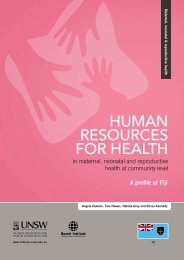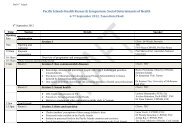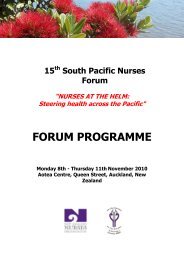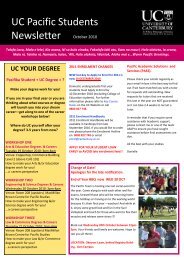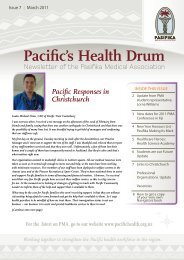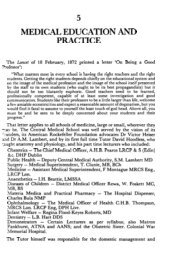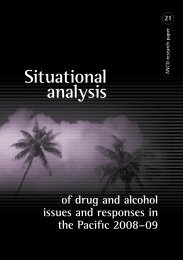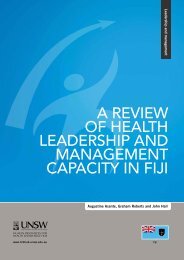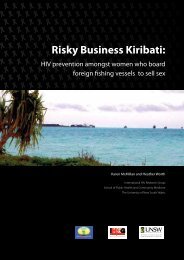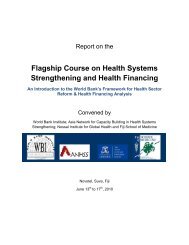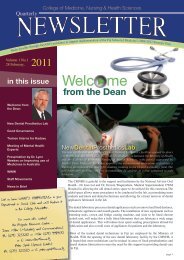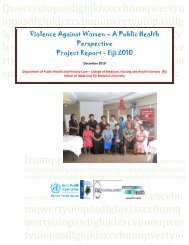rp21 situational analysis - Pacific Health Voices
rp21 situational analysis - Pacific Health Voices
rp21 situational analysis - Pacific Health Voices
Create successful ePaper yourself
Turn your PDF publications into a flip-book with our unique Google optimized e-Paper software.
Situational <strong>analysis</strong> of drug and alcohol issues and responses in the <strong>Pacific</strong><br />
106<br />
is made up of Filipino 15.3 per cent, Chinese<br />
4.9 per cent, other Asian 2.4 per cent,<br />
Caucasian 1.9 per cent, Carolinian 1.4 per<br />
cent, other Micronesian 1.1 per cent, other<br />
or unspecified 3.2 per cent. 495 Census data<br />
suggest there are a relatively large number<br />
of people in Palau who identify as having<br />
no specific religion, numbering 16.4 per cent<br />
of the population. Religious affiliations are<br />
noted as: Roman Catholic 41.6 per cent,<br />
Protestant 23.3 per cent, Modekngei 8.8<br />
per cent (indigenous to Palau), Seventh-Day<br />
Adventist 5.3 per cent, Jehovah’s Witness<br />
0.9 per cent, Latter-Day Saints (Mormons)<br />
0.6 per cent, and other 3.1 per cent. Significantly,<br />
Palau is a matrilineal society with<br />
land tenure linked to women. 496 One-third<br />
of the population are foreign workers, making<br />
up an estimated 73 per cent of the total<br />
workforce. 497 The combined impact of this<br />
population composition and the free movement<br />
of Palauan people to the United States<br />
deserves in-depth research, especially in relation<br />
to patterns of drug and alcohol use.<br />
Government<br />
Palau, formerly part of the Caroline Islands<br />
cluster, spent three decades as part of the<br />
United Nations Trust Territory of the <strong>Pacific</strong><br />
under United States administration. In 1978<br />
Palau opted for independence in preference<br />
to joining the Federated States of Micronesia.<br />
498 A Compact of Free Association with<br />
the United States was ratified in 1993 resulting<br />
in full independence in 1994. 499 Palau is<br />
a representative democracy, with its elections<br />
synchronised to the United States four-year<br />
cycle. 500 The President is both head of state<br />
and head of government; 501 and there are<br />
16 State representatives, one for each of the<br />
16 States. 502 Notably, the Council of Chiefs<br />
acts as an advisory body for the President<br />
and is consulted on matters of traditional<br />
law and customs. 503 Under the Compact, the<br />
United States Government agrees to pay in<br />
the vicinity of US$450 million over 15 years,<br />
an arrangement that expires in 2009. 504<br />
In addition, the Compact allows the Palauan<br />
495 Ibid., according to the 2000 Census data.<br />
496 Country report: Palau. In Freedom in the World 2008: the annual survey of political rights and<br />
civil liberties. Washington DC: Freedom House. Available at: (accessed March 2009).<br />
497 Ibid.<br />
498 Above, fn.494.<br />
499 Above, fn.496.<br />
500 Palau’s last general election was held on 4 November 2008. Its first presidential election on the<br />
same day resulted in the election of Johnson Toribiong as President.<br />
501 Above, fn.491.<br />
502 Above, fn.492.<br />
503 Ibid.<br />
504 Ibid.



